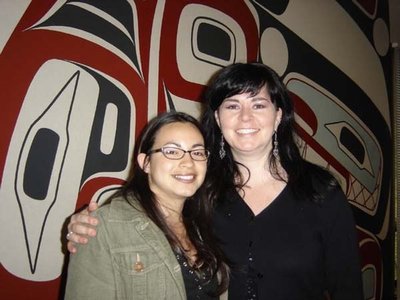May 24, 2007
Science society’s new science chapter gaining momentum at the UW
By Sibrina N. Collins
The Graduate School
While attending last year’s conference of the Society for the Advancement of Chicanos and Native Americans in Science (SACNAS), Charla Lambert, a graduate student in the UW Genome Sciences Department, had a revelation.
“I ran into many students and postdocs from the UW who were independently involved with the society,” she said. “All of our stories were similar because we all used SACNAS as a means of support, networking, inspiration and professional development.”
So, Lambert thought, why not organize a student chapter of the society here? That way, she and the others could get support on campus, not just at the national conference.
A number of science, technology, engineering and mathematics graduates students rallied to the cause. Amber Caracol in the Department of Molecular and Cellular Biology; Amanda Bruner, laboratory technician at the Fred Hutchinson Research Center; Tracie Delgado in the Department of Microbiology; Ramon Mendoza in the Molecular and Cellular Biology program and Yolanda Sanchez in the Department of Environmental and Occupational Health established the first UW SACNAS Chapter, holding their first membership drive earlier this month in the Ethnic Cultural Center.
The students have tapped Jimmie Lara, associate professor in the Department of Microbiology, to serve as the faculty adviser. “This chapter provides an excellent vehicle for students to identify with other students with similar backgrounds and interests,” says Lara.
Sanchez believes that a UW SACNAS chapter will provide additional support for under-represented graduate students majoring in the science, technology, engineering, and mathematics disciplines. “It is important for graduate students to connect with other graduate students who have similar experiences,” she said. “SACNAS at the UW will provide an environment to help create and establish community among scientists of color, specifically Chicanos and Native Americans. This community will help provide academic and social support.”
Mendoza agrees and believes that a UW SACNAS chapter will provide much needed support for under-represented graduate students pursuing PhDs. “I am not sure what the numbers are on those minority students that get into a graduate program and then go on to finish. Remember, getting into graduate school is only a small part of the battle. There are a whole series of hurdles that all students have to overcome within the first two years of graduate study, let alone minority students who have the added feeling of isolation,” said Mendoza.
Augustine McCaffery, a senior academic program specialist in the UW Graduate School and adviser to Native Students in Advanced Academia (NASAA), a graduate student organization, recognizes the representation of American Indian and Alaska Native students are few in the science disciplines, not only at the UW but nationally.
“Formation of a UW SACNAS Chapter will be an excellent support and networking mechanism for American Indian and Alaska Native students,” she said. “It will also be an opportunity for them to connect with other Native student organizations such as NASAA, and the American Indian Science and Engineering Society UW Chapter,” says McCaffery.
Edward Ramos, who earned his doctorate in genome sciences at the UW last year, is delighted that the UW SACNAS chapter is gaining momentum. “Establishment of the UW SACNAS chapter is a logical step that reflects Seattle’s continued diversification and expansion not only in local science and biotechnology industries but in the city’s population as well. Any opportunity that allows for the growth and establishment of relationships between individuals of diverse backgrounds is a welcome one,” he said. Ramos is currently a public policy fellow with Senator Barack Obama.
Dr. Paul Ramsey, CEO, UW Medicine and dean of the UW School of Medicine, certainly believes that the UW SACNAS chapter will help with recruitment and retention of under-represented students in the scientific fields. “The UW School of Medicine strongly supports all efforts to improve diversity in the health professions and the scientific community. Our Office of Multicultural Affairs works with students, staff, and faculty on a daily basis and sponsors many diversity programs. We enthusiastically endorse the work of SACNAS,” he said.
For more information regarding the UW SACNAS Chapter, please visit http://students.washington.edu/sacnas/. Additional information regarding SACNAS Organization can be found at www.sacnas.org.

